22 Oct2020
By Andre ChenFeng
“We are more than test scores.” That was the refrain I heard from my social sciences colleagues in the teachers’ lounge protesting our school’s focus on standardized tests. The middle school was located in a poverty-impacted community with over 95% of students of color. In 2009, I was finishing my fifth-year teaching and recall asking myself, “Why are the standardized tests such an evil thing? Don’t we need assessments to measure what the students are learning?” (ChenFeng, 2009).
One of the signature education policies in my early career was the No Child Left Behind (NCLB) Act of 2002. Teachers have different opinions of NCLB, but most educators and policy makers would agree that NCLB brought upon a culture of “over-testing and one size fits all mandates” (Duncan, 2015). During the 12 years I taught middle school math in Los Angeles, not once did I examine the intersection of white supremacy and education policy in my own classroom instruction. Overwhelmed by the high-stakes testing environment, and with a roster of 130 students, I was not aware of the impact of federal education policy on my teaching beliefs and instruction. In retrospect, I upheld color-evasive ideology and believed in a pedagogy that promoted the myth of meritocracy (Bonilla-Silva, 2017 as cited in Diem & Welton, 2020). In other words, I did not consider how race and racism shows up in the classroom or the ways I was complicit in perpetuating the false notion of pulling ourselves up by the bootstraps.
20 Oct2020
By Nicole Dunn
AACTE invites you to participate in a webinar hosted by the Wallace Foundation and RAND to discuss insights from The Partnerships for Social Emotional Learning Initiative (PSELI).
PSELI is a comprehensive, multiyear initiative funded by The Wallace Foundation to explore whether and how students can benefit from intentional partnerships between schools and afterschool/out-of-school time programs focused on building social-emotional skills—and what it takes to do this work.
This free webinar, will share important insights from a new RAND report, Early Lessons From Schools and Out-of-School Time Programs Implementing Social and Emotional Learning, that examines 38 sites in six communities during the first two years of the PSELI initiative. AACTE encourages members not to miss this event at a time when interest in SEL is outstripping empirical guidance about how to implement these programs and practices.
Researchers from RAND will focus on topics such as developing adults’ capacity to promote SEL, improving climate and delivering SEL instruction to students, executing system-level activities to launch and coordinate SEL work across multiple sites, and developing partnerships between schools and afterschool/out-of-school time programs.
20 Oct2020
By Robin Chenoweth
The following article is an excerpt from Inspire Magazine and is reprinted with permission.
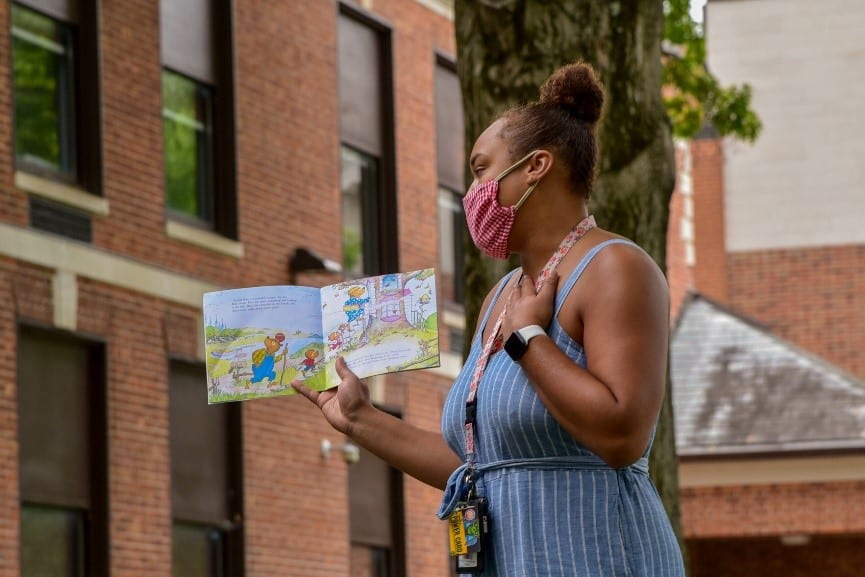 After schools shut down in March due to COVID-19, teacher Sarah Thornburg and her team tackled remote teaching with gusto.
After schools shut down in March due to COVID-19, teacher Sarah Thornburg and her team tackled remote teaching with gusto.
“We were like, ‘Let’s go.’ We found out, not only could we not teach the way that we wanted, but we shouldn’t,” the Columbus, Ohio, teacher said. “Everything had to slow down and focus not on content but on (students’) mental well-being.”
Some high-schoolers doubled work hours to pay bills. Some feared they would expose grandparents to the virus. Families lost businesses.
“That’s a burden that’s incredible for anybody to have, much less for a 15-year-old to deal with,” Thornburg said. “You can’t teach a child who’s completely freaking out about, ‘Are we going to lose our home?’ That was eye-opening.”
20 Oct2020
By Caitlin Wilson
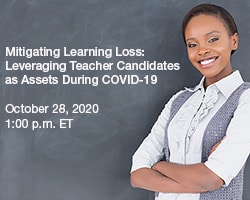 As students and teachers continue to navigate remote and hybrid learning environments, many are feeling overwhelmed. Parents and teachers are worried about the learning loss that has already and continues to occur during the pandemic. District staff are trying to address budget and service delivery uncertainty posed by the COVID-19 crisis. All of these factors may minimize important opportunities for collaboration between educator preparation programs and school districts. However, the repeated pandemic theme of getting through this together may be the key to addressing some of these challenges. Through collaboration with P-12 teachers, teacher candidates can assist in remote and hybrid learning in several ways to include co-teaching and one-on-one student support.
As students and teachers continue to navigate remote and hybrid learning environments, many are feeling overwhelmed. Parents and teachers are worried about the learning loss that has already and continues to occur during the pandemic. District staff are trying to address budget and service delivery uncertainty posed by the COVID-19 crisis. All of these factors may minimize important opportunities for collaboration between educator preparation programs and school districts. However, the repeated pandemic theme of getting through this together may be the key to addressing some of these challenges. Through collaboration with P-12 teachers, teacher candidates can assist in remote and hybrid learning in several ways to include co-teaching and one-on-one student support.
To discuss these opportunities for collaboration and to share examples of how teacher candidates are supporting teachers during this crisis, CCSSO is hosting a webisode on Mitigating Learning Loss: Leveraging Teacher Candidates as Assets During COVID-19. This webisode will feature key recommendations and discussion around the joint issue brief from CEEDAR, the Center for Great Teachers and Leaders at AIR, and AACTE released this summer: Addressing Shortages of Educators in an Uncertain COVID-19 Landscape: Viewing Teacher Candidates as Assets.
20 Oct2020
By Meghan Grenda
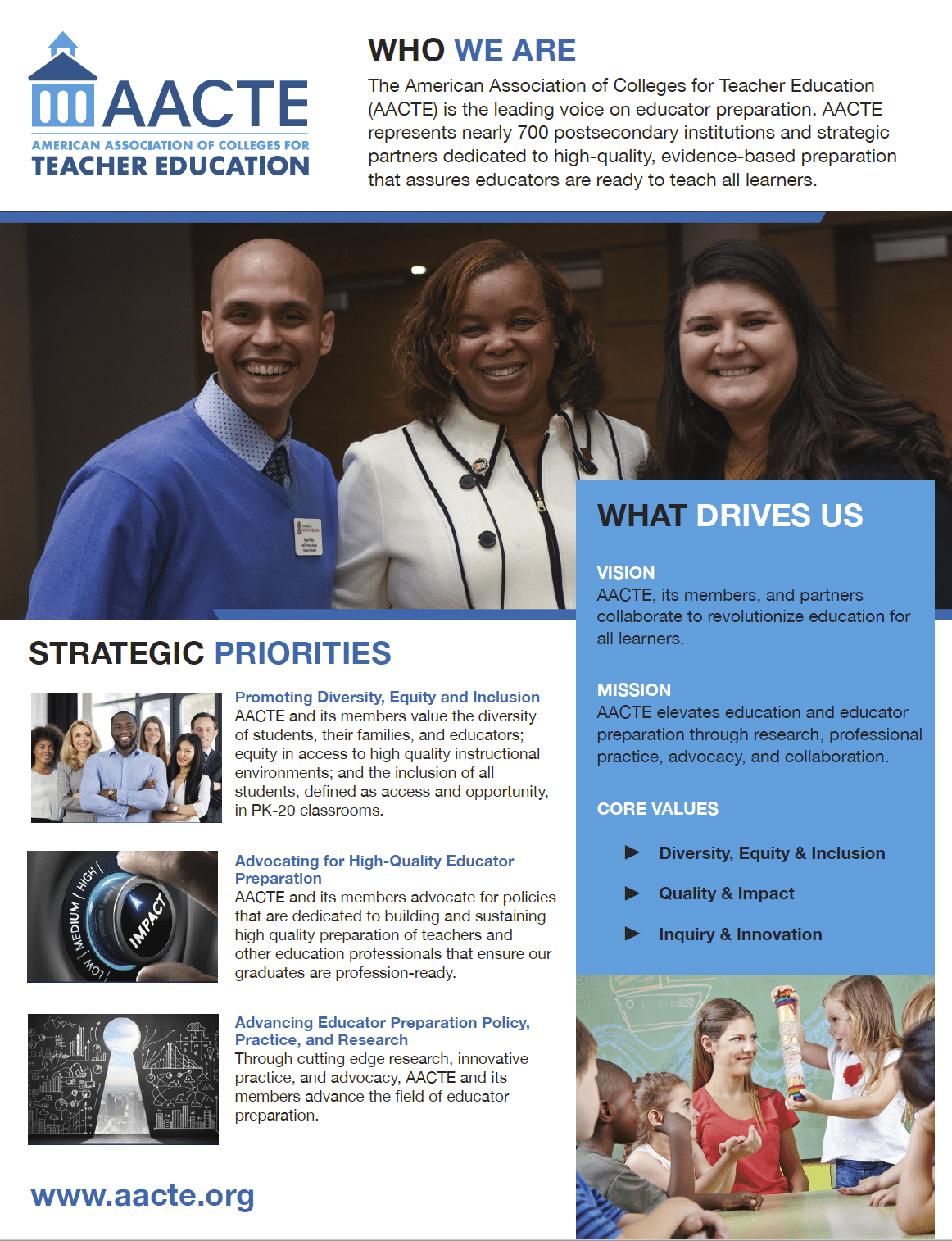 Did you know the AACTE member community is over 15,000 strong? AACTE membership is institutional—meaning when the university or college joins, all students, faculty, staff, and administrators also become members—with over 17,000 individuals served. These members represent nearly 700 postsecondary institutions and strategic partners who are dedicated to high-quality, evidence-based preparation that assures educators are ready to teach all learners.
Did you know the AACTE member community is over 15,000 strong? AACTE membership is institutional—meaning when the university or college joins, all students, faculty, staff, and administrators also become members—with over 17,000 individuals served. These members represent nearly 700 postsecondary institutions and strategic partners who are dedicated to high-quality, evidence-based preparation that assures educators are ready to teach all learners.
Member institutions include public and private schools both large and small from across the country. AACTE serves members with less than 25 graduates all the way up to institutions with over 1,000 graduates from all 50 states.
AACTE has released its latest membership tool, a one-page profile that shares members statistics and much more, including strategic priorities, educational offerings, and professional development opportunities.
AACTE’s strategic priorities: Promoting diversity, equity and inclusion; advocating for high-quality educator preparation; and advancing educator preparation policy, practice, and research are what guides the association’s mission, vision, and core values. AACTE members and partners revolutionize education for all learners and elevate educator preparation through research, professional practice, advocacy, and collaboration while maintaining a commitment to diversity, equity, inclusion, quality, and innovation.
19 Oct2020
By Nadine Gilbert
This article, part two of a three-part series, originally appeared on the Education First Blog and is reprinted with permission.
Tackling curriculum in a teacher preparation program is complicated work. At Jackson State, we have three pathways and 18 teaching faculty members across multiple course offerings in the junior and senior course sequence run by the college of education. But we knew that if we wanted to truly transform the experience and eventual effectiveness of our teacher candidates, overhauling the clinical experience—which I described in my previous post—wasn’t enough. And we knew we needed to come together as a team of administrators and faculty to develop a strong vision for the why and how to do it successfully.
In 2016, we set two goals for ourselves: first, we needed to tightly align each course to the Mississippi Teacher Intern Assessment Instrument (TIAI), the instructional rubric we use to measure our candidates’ proficiency with teaching. (As I described in my previous post, US PREP was a key partner and critical friend in all of our transformation work, including the curriculum work.) This alignment work included revisiting the early field experiences embedded in coursework that precedes candidates’ formal clinical experience. Second, we revisited the sequence of courses to ensure within each pathway, faculty could build teacher candidate skills in a logical progression.
Fast forward to today: although daunting, we did it. With US PREP’s support and the momentum from our clinical experience work, we channeled the urgency we all felt to achieve our goals. With the exception of a few legacy candidates, our teacher candidates are right now taking revamped courses. And by this time next fall, we will have fully implemented the program-wide curriculum changes.
16 Oct2020
By Deirdre Armitage
This article is part of a series on clinically rich teacher preparation in New York State, coordinated by Prepared To Teach at Bank Street College. The text is adapted from their latest report, Making Teacher Preparation Policy Work: Lessons From and For New York, and shared by the featured institution.
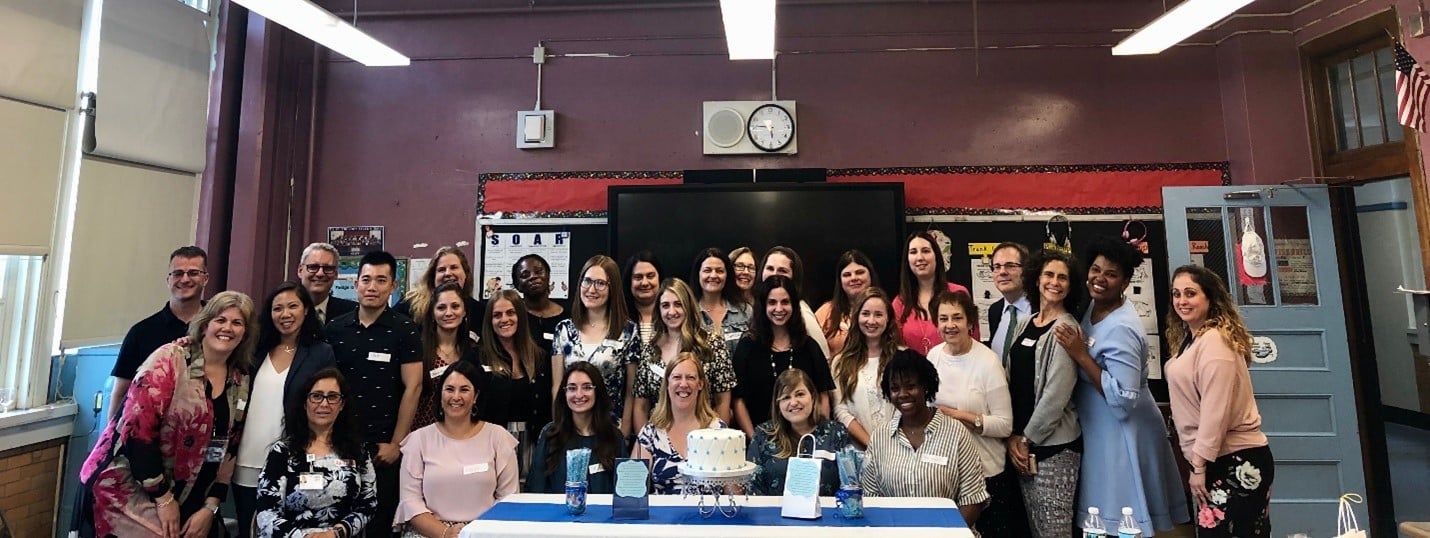
The College of Staten Island (CSI) enrolls many diverse first-generation college students. A number of these students support their families and themselves, working multiple jobs and limiting expenses while studying—making it impossible to pursue a traditional student teaching pathway that includes a semester of unpaid, full-time student teaching. Seeing that many students were effectively being excluded from teacher preparation, the College and its partner schools set out to create a teacher residency that paid students for their time spent in classrooms, providing an accessible path to a teaching career.
16 Oct2020
By Ward Cummings
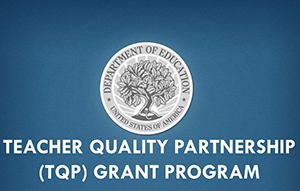 The Department of Education has awarded 23 grants administered as a of part of a pool of funding created to benefit programs including the Teaching Quality Partnership Program (TQP). Of the 10 grants awarded under Teacher Quality Partnerships program—totaling $7.3 million—six of the grantees are AACTE members.
The Department of Education has awarded 23 grants administered as a of part of a pool of funding created to benefit programs including the Teaching Quality Partnership Program (TQP). Of the 10 grants awarded under Teacher Quality Partnerships program—totaling $7.3 million—six of the grantees are AACTE members.
The 23 grants, totaling nearly $100 million, will promote educator development and training in alignment with a signature economic initiative of the Administration. The grants are designed to contribute to the enhancement of the professional development and effectiveness of teachers and principals. Each of the awards went to schools or nonprofits that connect in some way with economic Opportunity Zones to serve economically distressed or underserved communities around the country.
The Teacher Quality Partnership grant program, authorized in Title II of the Higher Education Act, is the only federal initiative designed to strengthen and reform educator preparation at institutions of higher education. Strongly supported by AACTE, TQP grants support the preparation of profession-ready teachers for high-need schools and high-need subject areas. Under this program, partnerships between institutions of higher education and high-need schools and districts compete for funding to develop master’s-level residency programs or to reform undergraduate preservice preparation programs.
15 Oct2020
By Jerrica Thurman

Registration is now open for AACTE’s virtual 2021 Annual Meeting, February 24-26. Themed “Resisting Hate, Restoring Hope: Engaging in Courageous Action,” the conference will feature hundreds of education presentations, keynote sessions, a virtual exhibit hall, and networking opportunities. Join the digital forum from work or home and engage in meaningful discussion, share research and best practices, and become better equipped to drive change in educator preparation.
AACTE’s discounted registration rates are designed especially for you, your colleagues and students to attend the virtual conference this year. Take advantage of these special rates:
|
|
Early Bird
(on or before
December 4, 2020)
|
Advance Registration
(on or before
January 22, 2021)
|
Late Registration
(after January 22, 2021)
|
|
Member Rate
|
$349
|
$389
|
$419
|
|
Non Member Rate
|
$489
|
$539
|
$589
|
|
Emerging Leader
|
$179
|
$179
|
$179
|
|
Student or Holmes Scholar
|
$69
|
$89
|
$109
|
Register now for the AACTE 2021 Annual Meeting! Secure your spot and save when you register by the December 4 early bird deadline. Visit www.aacte.org for conference details, follow us on Twitter and Facebook, and join the conversation using #AACTE21.
Come experience the reimagined AACTE Annual Meeting – One community. One purpose. One voice.

15 Oct2020
By Lynn M. Gangone
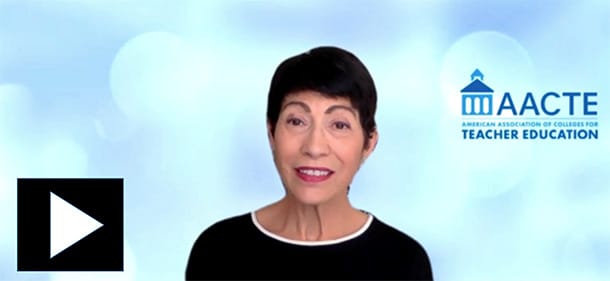
AACTE kicks off our inaugural, virtual Leadership Academy Series today, where participants will learn best practices for “Leading During Difficult Times.” Providing you timely and relevant professional development opportunities and resources to advance your institution, your programs, and your career is central to our mission at AACTE. Please take a few minutes to watch the video above and learn more about opportunities to engage with your Association.
AACTE released yesterday its latest issue brief on financial challenges facing future teachers. You may access the member-only resource at aacte.org. Your feedback on how AACTE can continue to support your work is valuable so be sure to complete the Fall Member Survey by November 6. And remember your voice truly matters; make your voice heard in the upcoming presidential election. Your voice, your vote!
15 Oct2020
By Azaria Cunningham
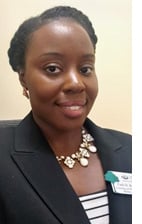 Carla Roberson is a doctoral candidate in the Counselor Education and Supervision program at Ohio University, where she is pursuing a concentration in mental health and rehabilitation counseling. Roberson is also a former McNair Scholar and alumnae of Kean University where she earned her bachelor’s degree in psychology. She previously served on the Holmes Council as the social media coordinator and continues to give back to the Holmes community.
Carla Roberson is a doctoral candidate in the Counselor Education and Supervision program at Ohio University, where she is pursuing a concentration in mental health and rehabilitation counseling. Roberson is also a former McNair Scholar and alumnae of Kean University where she earned her bachelor’s degree in psychology. She previously served on the Holmes Council as the social media coordinator and continues to give back to the Holmes community.
Roberson’s research investigates the lived experiences and psychological well-being of Black students and faculty in higher education. Her dissertation study, “A Phenomenological Study on the Experiences of Imposter Phenomenon among Black Doctoral Students at Predominantly White Institutions” focuses on the impostor phenomenon—a psychological pattern that makes it hard for people to internalize their own accomplishments—and its effects on doctoral students of color. She is committed to the recruitment and retention of underrepresented minority students and professionals in higher education. She hopes to become a professor, alongside her mental health pursuits, in order to inspire students by creating an environment for them to become effective clinicians, educators, and critical thinkers.
15 Oct2020
By Martha Spieker
The following article features comments by AACTE President and CEO Lynn M. Gangone on behalf of the Association in support of the legislation.

Senator Mazie K. Hirono (D-Hawaii), along with her colleague Senator Cory Booker (D-N.J.) announced their plan to introduce the Learning Opportunity and Achievement Act (LOAA), which would improve distance and blended learning in our public schools during the coronavirus pandemic. LOAA combats instructional loss, particularly for at-risk and marginalized students, by providing support for professional development and training programs for teachers, tutoring and academic services, research and best practices, and other initiatives to enhance equity and access for all students. Specifically, the bill provides funding to address instructional loss for at-risk and marginalized students, including low-income students, minority students, children with disabilities, English learners, migratory students, homeless children and youth, and children or youth in foster care.
“Over the past few months, I’ve heard from students, parents, and educators across Hawaii who are doing their best to adjust to distance learning during the coronavirus pandemic. My own education was fundamental to my success, and this generation of students deserves a quality education—regardless of the challenges the pandemic poses. LOAA provides vital resources so educators can support their students, particularly those who are most at risk for instructional loss. I will continue to advocate for robust funding that supports healthy and safe learning environments for students in Hawaii and across the country,” Senator Hirono said.
13 Oct2020
By AACTE
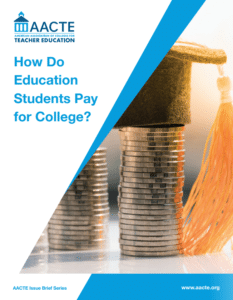 The American Association of Colleges for Teacher Education (AACTE) released today its latest issue brief, How Do Education Students Pay for College? The report provides colleges of education a closer look at the financial pressures impacting education students, by type of institution attended and by student race and ethnicity, through a detailed examination of the costs they face and the financial sources they use to pay those expenses. The findings reveal the financial challenges future educators will face and the financial disincentives to pursuing a teaching career, especially for students of color. It also supports the necessity of compensating educators fairly, in particular novice teachers who may be most burdened by student loan debt.
The American Association of Colleges for Teacher Education (AACTE) released today its latest issue brief, How Do Education Students Pay for College? The report provides colleges of education a closer look at the financial pressures impacting education students, by type of institution attended and by student race and ethnicity, through a detailed examination of the costs they face and the financial sources they use to pay those expenses. The findings reveal the financial challenges future educators will face and the financial disincentives to pursuing a teaching career, especially for students of color. It also supports the necessity of compensating educators fairly, in particular novice teachers who may be most burdened by student loan debt.
“The global pandemic has deepened the national teacher shortage crisis. It is critical now more than ever to recruit diverse, talented people into the teaching profession, which requires our nation’s leaders to revamp policies and practices that make college affordable and increase teacher compensation,” said Lynn M. Gangone, president and CEO of AACTE.
13 Oct2020
By Mary Murray
This article originally appeared in University Business and is reprinted with permission.

Photo by Nikolas Noonan on Unsplash
At the onset of the 2020-21 academic year, the educational system is in a coronavirus maze, wherein the turns are constantly changing, and the end seems out of sight. While state education departments, school districts and educator preparation programs (EPPs) are prepared—whether in class, online, or a hybrid of both—the pandemic reminds us how unpredictable the road ahead may be. Recently, some schools in the United States that reopened for in-class instruction have reversed their plans due to COVID-19 outbreaks.
13 Oct2020
By Nadine Gilbert
This article, part one of a three-part series, originally appeared on the Education First Blog and is reprinted with permission.
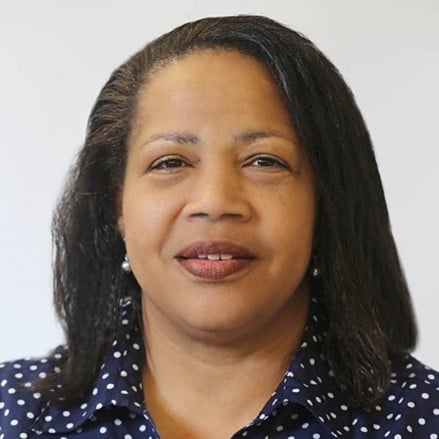 Back in 2015, a group of department chairs, administrative leadership, program directors and faculty at Jackson State University formed a task force to write a plan for transforming our teacher preparation program. In that plan, we identified areas of strength and areas we needed to improve. We wanted to build on the deep experience and wisdom of faculty, while taking a fresh look at how we could more strongly ground the experience of our teacher candidates in current K12 practices. At around that same time, we were fortunate to find incredible support by joining the US PREP coalition. With JSU leaders and faculty leading the way, the US PREP peer network and coaches acted as critical friends to strengthen and accelerate our work. We have achieved so much together.
Back in 2015, a group of department chairs, administrative leadership, program directors and faculty at Jackson State University formed a task force to write a plan for transforming our teacher preparation program. In that plan, we identified areas of strength and areas we needed to improve. We wanted to build on the deep experience and wisdom of faculty, while taking a fresh look at how we could more strongly ground the experience of our teacher candidates in current K12 practices. At around that same time, we were fortunate to find incredible support by joining the US PREP coalition. With JSU leaders and faculty leading the way, the US PREP peer network and coaches acted as critical friends to strengthen and accelerate our work. We have achieved so much together.







 After schools shut down in March due to COVID-19, teacher Sarah Thornburg and her team tackled remote teaching with gusto.
After schools shut down in March due to COVID-19, teacher Sarah Thornburg and her team tackled remote teaching with gusto. As students and teachers continue to navigate remote and hybrid learning environments, many are feeling overwhelmed. Parents and teachers are worried about the learning loss that has already and continues to occur during the pandemic. District staff are trying to address budget and service delivery uncertainty posed by the COVID-19 crisis. All of these factors may minimize important opportunities for collaboration between educator preparation programs and school districts. However, the repeated pandemic theme of getting through this together may be the key to addressing some of these challenges. Through collaboration with P-12 teachers, teacher candidates can assist in remote and hybrid learning in several ways to include co-teaching and one-on-one student support.
As students and teachers continue to navigate remote and hybrid learning environments, many are feeling overwhelmed. Parents and teachers are worried about the learning loss that has already and continues to occur during the pandemic. District staff are trying to address budget and service delivery uncertainty posed by the COVID-19 crisis. All of these factors may minimize important opportunities for collaboration between educator preparation programs and school districts. However, the repeated pandemic theme of getting through this together may be the key to addressing some of these challenges. Through collaboration with P-12 teachers, teacher candidates can assist in remote and hybrid learning in several ways to include co-teaching and one-on-one student support. Did you know the AACTE member community is over 15,000 strong? AACTE membership is institutional—meaning when the university or college joins, all students, faculty, staff, and administrators also become members—with over 17,000 individuals served. These members represent nearly 700 postsecondary institutions and strategic partners who are dedicated to high-quality, evidence-based preparation that assures educators are ready to teach all learners.
Did you know the AACTE member community is over 15,000 strong? AACTE membership is institutional—meaning when the university or college joins, all students, faculty, staff, and administrators also become members—with over 17,000 individuals served. These members represent nearly 700 postsecondary institutions and strategic partners who are dedicated to high-quality, evidence-based preparation that assures educators are ready to teach all learners. 
 The Department of Education has awarded 23 grants administered as a of part of a pool of funding created to benefit programs including the Teaching Quality Partnership Program (TQP). Of the 10 grants awarded under Teacher Quality Partnerships program—totaling $7.3 million—six of the grantees are AACTE members.
The Department of Education has awarded 23 grants administered as a of part of a pool of funding created to benefit programs including the Teaching Quality Partnership Program (TQP). Of the 10 grants awarded under Teacher Quality Partnerships program—totaling $7.3 million—six of the grantees are AACTE members.


 Carla Roberson is a doctoral candidate in the Counselor Education and Supervision program at Ohio University, where she is pursuing a concentration in mental health and rehabilitation counseling. Roberson is also a former McNair Scholar and alumnae of Kean University where she earned her bachelor’s degree in psychology. She previously served on the Holmes Council as the social media coordinator and continues to give back to the Holmes community.
Carla Roberson is a doctoral candidate in the Counselor Education and Supervision program at Ohio University, where she is pursuing a concentration in mental health and rehabilitation counseling. Roberson is also a former McNair Scholar and alumnae of Kean University where she earned her bachelor’s degree in psychology. She previously served on the Holmes Council as the social media coordinator and continues to give back to the Holmes community.
 The American Association of Colleges for Teacher Education (AACTE) released today its latest issue brief,
The American Association of Colleges for Teacher Education (AACTE) released today its latest issue brief, 
 Back in 2015, a group of department chairs, administrative leadership, program directors and faculty at Jackson State University formed a task force to write a plan for transforming our teacher preparation program. In that plan, we identified areas of strength and areas we needed to improve. We wanted to build on the deep experience and wisdom of faculty, while taking a fresh look at how we could more strongly ground the experience of our teacher candidates in current K12 practices. At around that same time, we were fortunate to find incredible support by joining the
Back in 2015, a group of department chairs, administrative leadership, program directors and faculty at Jackson State University formed a task force to write a plan for transforming our teacher preparation program. In that plan, we identified areas of strength and areas we needed to improve. We wanted to build on the deep experience and wisdom of faculty, while taking a fresh look at how we could more strongly ground the experience of our teacher candidates in current K12 practices. At around that same time, we were fortunate to find incredible support by joining the